Talk to a Registered Dietitian and use INSIDER20 for 20% off!
Talk to a real Dietitian for only $99: Schedule Now
This post contains links through which we may earn a small commission should you make a purchase from a brand. This in no way affects our ability to objectively critique the products and brands we review.
Evidence Based Research To fulfill our commitment to bringing our audience accurate and insightful content, our expert writers and medical reviewers rely on carefully curated research.
Read Our Editorial Policy
When planning your workout for the day, a lot more goes into it than simply deciding which muscle groups to target or how far you’re going to run.
You also need to plan for your post-workout nutrition, which significantly influences how your body responds to and recovers from a workout.
Without an adequately nutritious post-workout meal, you run the risk of muscle loss instead of muscle gain—essentially throwing your hard work down the drain.
If you’re short on post-workout fuel ideas, we’ve got you covered here with 11 easy meals, with options for breakfast, lunch, and dinner.
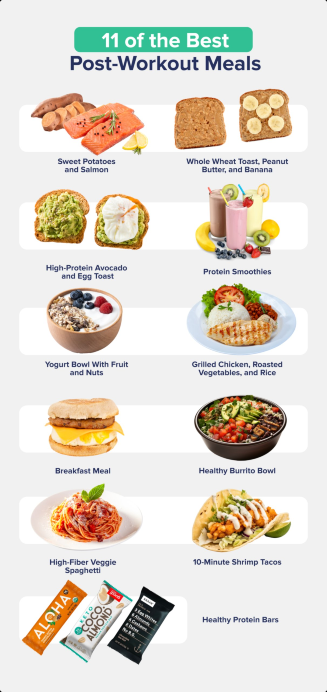
If you want to learn more about the basics of post-workout nutrition—including when to eat protein after a workout and ideal carb-to-fat ratios—scroll down to the bottom of this article.
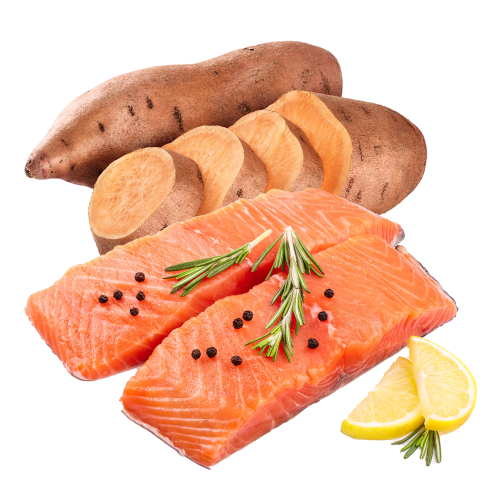
Sweet potatoes are one of the best foods to eat after a workout because they are a fiber-rich, nutrient-loaded complex carb.
As opposed to simple carbs (which digest immediately and have a quick energy and blood sugar impact), complex carbs take longer to digest, keep blood sugar more stable, and provide your body with a more extended hit of energy.
While sweet potatoes on their own are a healthy starchy veggie option, adding salmon to the mix boosts the protein content—an essential macronutrient to consume if you want to build muscle.
If you worked out before dinner, a sheet pan of salmon and sweet potatoes is a perfect post-gym meal—plus, salmon is an excellent source of omega-3 fats that can support muscle recovery and fight inflammation.
Simply add a diced sweet potato to a large sheet pan, add olive oil and spices (salt, pepper, garlic powder, and basil are always good), and bake at 425 degrees Fahrenheit for 15 minutes—then add a filet of seasoned or marinated salmon to the sheet pan and roast for another 15 minutes.
6oz salmon and 1 medium sweet potato:
Protein: 37g
Carbs: 25g
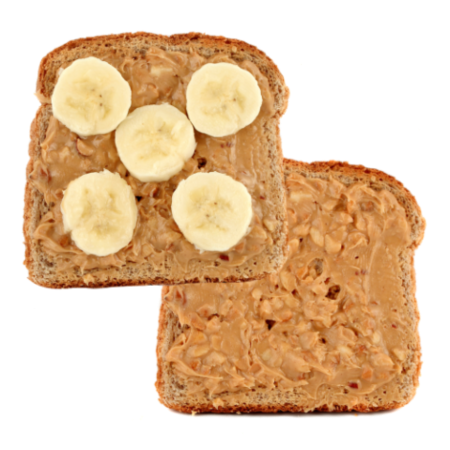
Although it sounds like something an 8-year-old might eat, banana and peanut butter on higher-fiber bread is a great post-workout meal for people of all ages.
Peanut butter (or your favorite nut butter) contains healthy monounsaturated fats, which are beneficial for weight loss and losing body fat, while bananas are rich in potassium to support muscle recovery.
You can also add hemp seeds for additional protein.
Two pieces of whole grain bread, 2-3 tablespoons of peanut butter or almond butter, one sliced banana, and a hefty sprinkle of hemp seeds will come in around 21 grams of protein and 60 grams of carbs.
As the carb count is a bit higher, this post-workout meal is best suited for higher-intensity cardio or endurance workouts.
Protein: 21g
Carbs: 60g
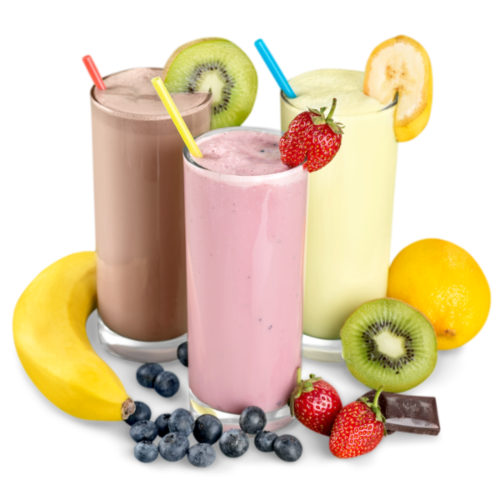
Aggressively mixing protein powder in a shaker bottle after a lifting sesh is the ultimate gym bro accessory—but they are onto something, as a well-crafted protein smoothie certainly has its post-workout benefits.
While protein shakes with water are typically protein-dominant, making a smoothie at home can add healthy carbs to support muscle recovery and glycogen synthesis further.
A good protein smoothie formula is:
This combination provides all of the essential amino acids, carbohydrates and fiber, and a few healthy fats to support satiety.
As a quick aside, we love collagen protein powders for many reasons (joint support, skin health, and gut function, to name a few), but collagen does not contain all nine essential amino acids, so it’s not the ideal choice for a post-exercise powder.
Protein: ~25-30g
Carbs: ~35-45g
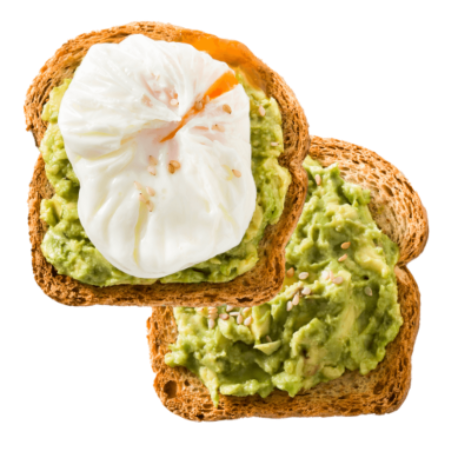
Not just for millennials, avocado toast is a solid post-exercise meal—especially if you make a higher-protein version by adding diced hard-boiled eggs.
Containing healthy fats, fiber, and protein, avocados are one of the rare fruits that contain a great balance of all three macronutrients.
Pairing a whole avocado with two chopped hard-boiled eggs atop two slices of toast (we like whole grain bread or sourdough) can provide 21g of protein and 55g of carbs—another excellent meal after a run or cardio-heavy workout.
We also love adding Everything But the Bagel Seasoning (okay, maybe we are millennials), crunchy chili crisp, or lemon juice and salt.
Protein: 21g
Carbs: 55g
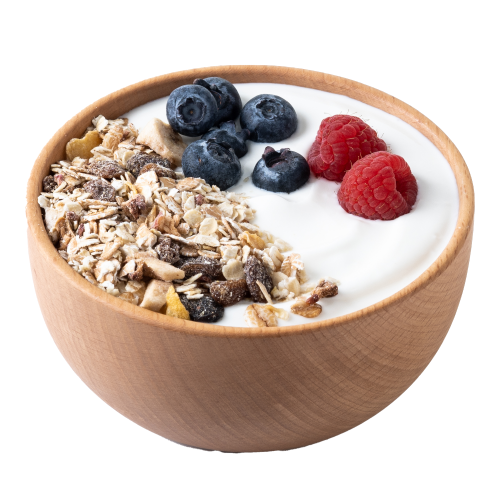
Greek yogurt is an underappreciated post-exercise hero, with 20 grams of protein per 7 ounces to support muscle repair and new muscle growth.
Although you hit the lower end of a post-workout protein requirement with just 7 ounces of Greek yogurt alone, adding some fruit (like blueberries or strawberries) and nuts can increase the carb content to replenish your body’s glycogen stores.
Regarding the yogurt’s fat content, choose non-fat if you want a leaner protein source and full-fat to increase your satiety after this meal.
For 8oz of 2% fat Greek yogurt, ½ cup blueberries, and 2 Tbsp almonds:
Protein: 26g
Carbs: 22g
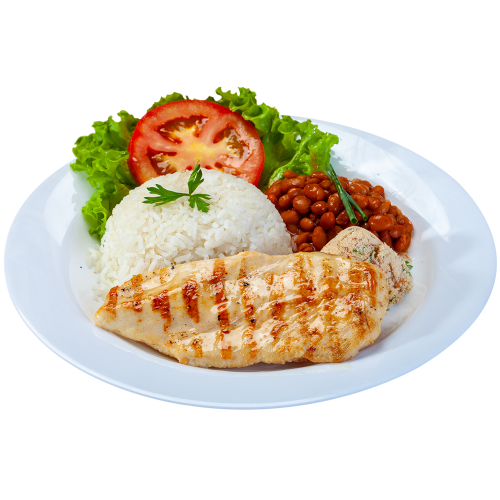
Ah, the classic post-workout meal of chicken and broccoli (but let’s make it a little more exciting, yes?).
Chicken is much-loved by the fitness community because it’s a lean protein that is very versatile.
With 8g of protein per ounce, chicken is an excellent choice for getting your protein in after a workout—and pairing it with vegetables and rice adds in your much-needed healthy carbs.
We love roasted vegetables (feel free to do this ahead of time on meal prep day to save time), including roasted potatoes, carrots, asparagus, cauliflower, or broccoli.
To roast veggies, simply chop them in roughly the same size (so they cook evenly), toss them with avocado oil and some seasonings (salt, pepper, garlic powder, and rosemary are always good), and roast them at 425 degrees Fahrenheit for 20-30 minutes.
If you did more cardio today, add ¾ cup of rice, while strength training days could have ¼ cup to ½ cup.
While brown rice has more fiber and nutrients, it can be more challenging to digest after a workout, so many people opt for white rice in this scenario.
For 4 oz grilled chicken, 1 cup roasted veggies, and ½ cup white rice:
Protein: 36g
Carbs: 38g
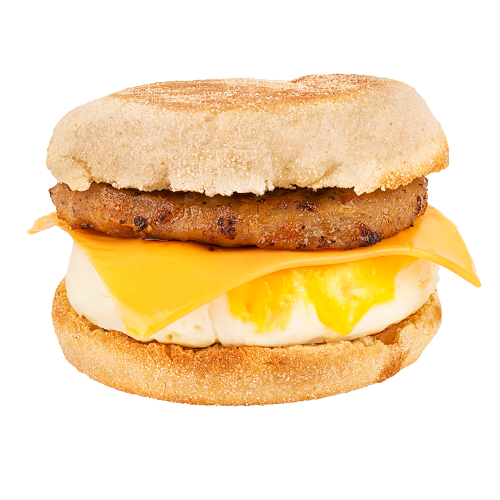
If you’re an early morning exerciser, then chances are you are heading for the breakfast foods when you finish your workout.
If you did a strength or resistance training workout, load up your breakfast bowl with proteins like pasture-raised bacon, turkey/chicken sausage, cheese, and eggs.
If you were heavier on the cardio today, add a whole-wheat English muffin, hashbrowns, or some sourdough toast to increase your carb content.
This recipe is highly customizable, so we don’t have protein and carb counts. (For a rough guideline as you build your bowl, each egg has 6g of protein, each link of chicken sausage has 3g of protein, and each slice of bacon has 3g.)
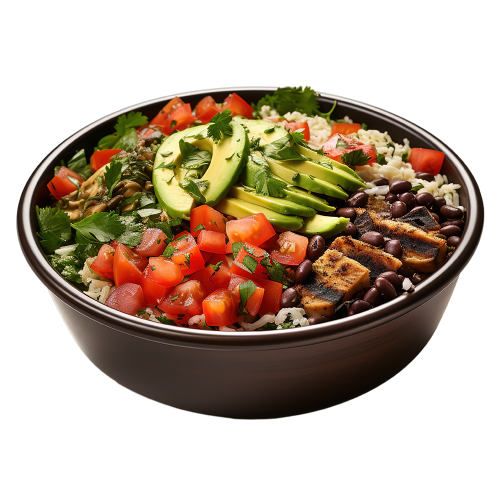
Move over Chipotle—it’s time to make healthier burrito bowls at home for a fraction of the price (no extra charge for guac in your kitchen!).
Burrito bowls are great for a post-exercise meal because they are highly customizable—you can easily make them vegan, vegetarian, lower-carb, or higher-carb by tweaking the ingredients.
A combination we love is:
Protein: ~50g
Carbs: ~50g
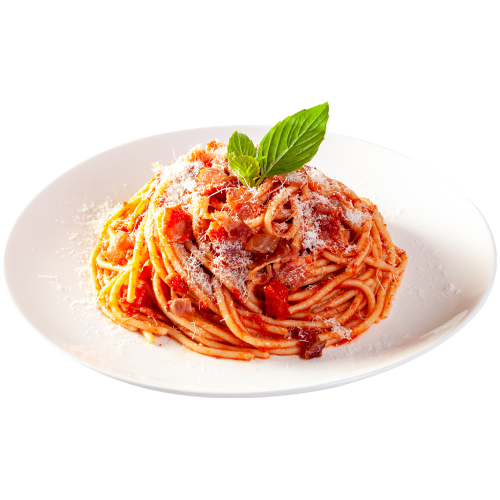
You don’t always need meat to fulfill your protein needs—this recipe is a post-workout meal for vegetarians or anyone wanting to cut back on their meat intake.
We love high-fiber and high-protein pasta like the chickpea spaghetti from Banza, which provides 8g of fiber and a whopping 14g of protein per serving.
Add in a healthy smattering of cooked veggies (zucchini, yellow onion, carrots, and bell pepper go particularly well), marinara sauce, and grated Parmesan cheese, and you’ve got yourself a loaded vegetarian post-exercise lunch or dinner.
Protein: ~25g
Carbs: ~50g
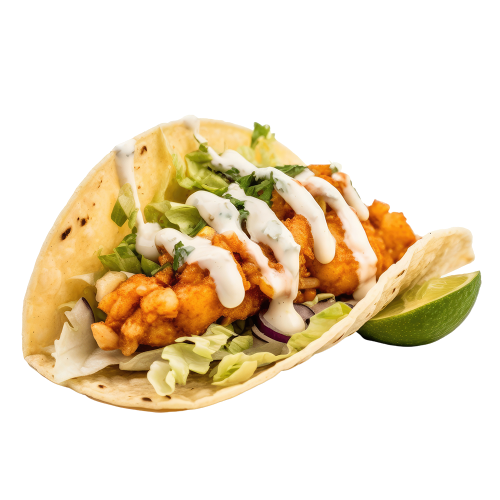
Shrimp is one of the fastest-cooking proteins, making it an excellent choice for a hearty post-workout dinner when you get home from the gym starving—plus, it’s a lean protein with hardly any fat.
Here’s what you’ll need (this will serve two people—or one super hungry person):
Simply pat the shrimp dry with a paper towel, then toss it with the seasonings in a bowl. Heat the olive oil in a large skillet over medium heat and cook the shrimp for 3-4 minutes, until they are cooked through and not translucent. Fill up your tacos with shrimp and toppings like cabbage slaw, cheese, lime juice, sliced avocado, salsa, or hot sauce.
Protein: ~23-25g
Carbs: ~25-30g
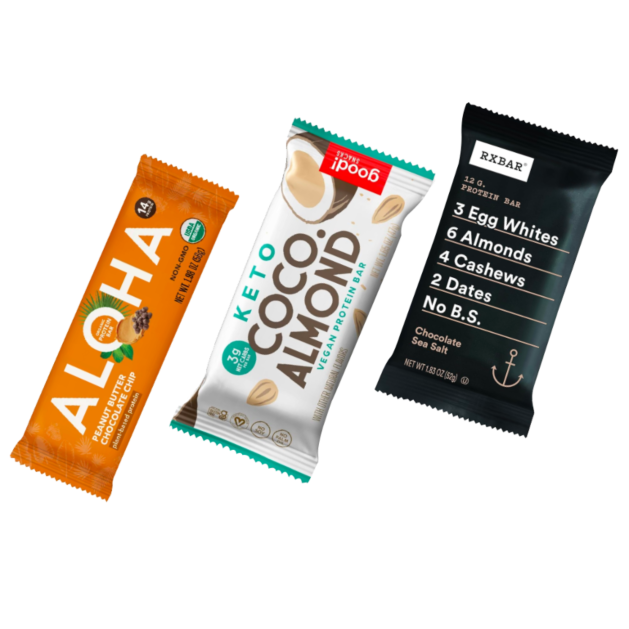
If you’re in a pinch and don’t have access to a kitchen or healthy to-go options, many protein bars can fit the bill for a post-exercise snack—but remember that they typically are not meal replacements and don’t contain enough protein for full muscle recovery.
Choose a healthy protein bar that is low in sugar, contains fiber, and doesn’t have artificial sweeteners or sketchy ingredients.
Some of our favorites include:
Protein: 10-15g
Carbs: 15-30g
While all three macronutrients are needed for overall health, protein and carbs are more known for their role in post-workout recovery than fats.
Exercise triggers muscle protein breakdown and causes microscopic muscle tears, so ensuring adequate protein consumption throughout the day is vital for repairing those damaged muscle proteins and building new muscle tissue.
While you don’t necessarily have to chug down a protein shake within an hour after working out, that post-workout window can be a helpful time to remember to check on your protein intake—and the sooner you give your body protein, the sooner it can start to rebuild muscle proteins.
If you are aiming to build muscle, eating 20-40 grams of protein within one to two hours after a workout may help to stimulate new muscle protein synthesis—however, this is highly dependent on your body type, fitness goals, and workout intensity and length.
Next, carbs are crucial to help your body recover from a workout, as they replenish the muscle glycogen stores used as fuel during exercise.
When glycogen stores have been depleted, it leads to a breakdown of muscle tissue.
Consuming carbs and protein together promotes insulin secretion, leading to glycogen synthesis and repletion.
Research shows that you can restore glycogen the fastest by consuming 0.4 grams of carbs per pound of body weight—but this may be more relevant for endurance athletes than strength trainers.
Overall, a post-workout meal containing high-quality protein and complex carbohydrates is a great way to promote muscle protein synthesis, repair broken-down muscle tissue, and replenish glycogen stores.
As far as amounts go, a good rule of thumb is a 1:1 ratio of carbs to protein if you did a strength training workout, a 2:1 ratio of carbs to protein if you did a cardio session, and a 3:1 ratio if you completed a long and intense endurance cardio workout.
Lastly, timing doesn’t matter as much as previously thought—newer studies indicate that you may have up to several hours post-workout to get your protein and carbs in.
Plus, it’s important to remember that muscle recovery doesn’t just happen in that one-hour post-workout window—it’s an ongoing process, so ensuring you eat a healthy balance of carbs and protein every 4 hours or so is ideal.
The best post-workout meal contains both protein and carbs—however, the ratios will vary depending on what type of workout you did.
If you did a higher-intensity or longer cardio-based exercise session, you’ll need more carbs to replenish glycogen stores than someone who did a weight training workout.
Typically, a ratio of 1:1 (carbs to protein) is recommended if you did a strength training workout, a 2:1 ratio of carbs to protein if you did a cardio session, and a 3:1 ratio if you completed a long and intense endurance cardio workout.
The best foods to eat post-workout are higher protein and complex carbs.
Combinations like Greek yogurt and berries, meat and veggies, protein shakes with banana, and toast with peanut butter are good options.
After a workout, carbs like fresh fruit, starchy veggies, whole grains, and dairy (if you tolerate it) are good choices. These carbs can help you bounce back faster after a tiring workout and can help to increase your blood sugar levels in a healthy way, as exercise tends to cause a blood sugar dip.
One caveat is that some people have trouble digesting higher-fiber carbs after a workout, which may take some trial and error to see what your body prefers. For example, if you get a stomachache after having whole wheat bread or brown rice, try eating a smaller amount of lower-fiber bread (like sourdough) or white rice.
Research is conflicting, but generally, eating 20-40 grams of protein within one hour of a workout is a good idea. Some sports medicine researchers now say you have up to several hours to get your protein in.
However, be sure that that is not the only time you’re eating protein—consuming protein throughout the day is recommended to support muscle health.
If you don’t eat protein after exercising—especially after strength or resistance training—you are at risk of muscle loss, as you’re not providing your body with the building blocks needed to build new muscle and repair damaged muscle from exercise.